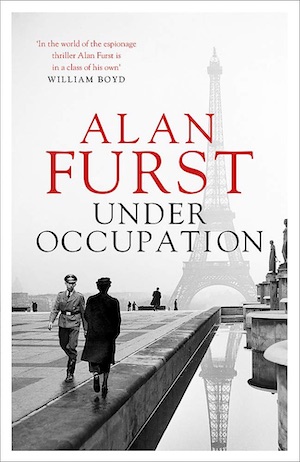Written by Alan Furst — Political thriller writer Alan Furst is the master of ‘storm clouds massing over Europe’ novels, set in the 1930s. His protagonists are most often ordinary Joes who agree to perform some minor anti-fascist act. It’s as if they consider the continent’s deteriorating political situation and ask themselves, ‘How dangerous could it be?’ Well, with the benefit of hindsight, you know the answer, and if they don’t want to risk life, loves – everything – they should hurry home and lock the doors. Inevitably, one act leads to another and another and another, and soon they’re in very deep waters indeed.
Novels that feature the ordinary person in extraordinary
circumstances are a particular pleasure to read, because you can imagine that
person, someone pretty much like you, really, in such an encounter and feel
their ambivalence, experience their fear, and, most of all, wonder what you
would do in the protagonist’s place.
I’ve greatly enjoyed Furst’s early books, which explored many facets of the war in the various countries of central Europe – Poland, Hungary, Romania – in Moscow, in Spain during the Civil War. Under Occupation returns to his most familiar writing territory, France and Paris, specifically. The earlier books dwelt on larger strategic questions of the war and how that unprepossessing protagonist fit into it. By contrast, in this latest book, the hero’s contribution is, frankly, slight.
The novel tells the story of thriller writer Paul Ricard,
who comes into possession of a schematic for a German torpedo detonator. Through
his contacts, he finds out how to get this scrap into the hands of the British.
On the strength of the schematic, he’s asked to take on more assignments, with
no apparent vetting of him or suspicion he might be a dangle.
He decides, rather impetuously, to become involved in the
resistance and, while there are plenty of good reasons a Frenchman might have
made that decision, most did not. Thus a little more exploration of why this
particular person made that choice would be important. Without any training and
with only cursory briefing, he infiltrates Polish shipyards, tests the security
of France’s escape routes, finds safe houses, and performs other feats. You
have to take an awful lot for granted to see how any of this is even remotely
possible. And as suddenly as he was recruited, he’s told to suspend operations
and leave the country. Not so easy, you’d think.
Yet the plot moves swiftly forward, like one of those U-boat torpedoes, hurtling toward a conclusion, regardless of the loose ends and perturbations of logic it its wake. As only one example, near the end, in the midst of a snowstorm, Ricard and a woman are fleeing on foot, mere seconds ahead of the Gestapo. If the Germans had only looked for footprints in the snow, their job would have been a lot easier.
Many of Furst’s earlier books were 350 to 400 pages long, a compelling
and total immersion in events, strategies, and the complexity of trust in a
time of extreme peril. This book comprises barely 200 pages. If you’ve read the
previous books, you bring a lot to the experience of this one. Perhaps you can
fill in the elisions and understand the details of what he’s merely sketched
in, but you shouldn’t have to. It is almost as if Furst ‘phoned it in,’ as Americans
say. And it pains me to say so.
If you like thrillers about the World War II period, try the work of Philip Kerr, featuring police detective Bernie Gunther.
Weidenfeld & Nicholson
Print/Kindle/iBook
£10.99
CFL Rating: 3 Stars
